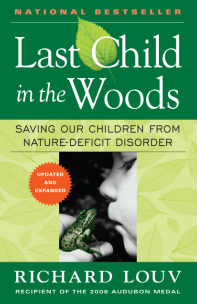|
“We are in more trouble than we think,” said Richard Louv, journalist and bestselling author of Last Child in the Woods, in a public lecture at CU Boulder last Thursday. The most pressing issue in today’s society is not the presidential election, foreign policy, or even the economy. It is the lack of a positive collective environmental attitude, he said. Louv lamented the media’s almost exclusively negative portrayal of the future of the environment. The idea of the far future conjures up images of post-apocalyptic climate change, pollution and urban sprawl, he said. “Everything in the next 40 years must change,” Louv said. For the first time in history, more people now live in urban areas than rural ones, Louv related. Such a shift can lead to one of two future scenarios: People will either encounter the disappearance of daily environmental experiences, or they will initiate the beginning of a whole new kind of city, he said. Louv, ever the optimist, prefers the latter scenario and encourages active reimagination of the urban context. Louv categorizes the general populous into two types: “people who do, and people who write about people who do.” Louv counts himself among the writers rather than the doers. But the popularity and influence of Louv’s writings demonstrates the impact his work has had on environmentalism today. Nearly 500 people - university students, elementary teachers, grandparents, and wilderness advocates among them - filled the seats and lined the walls of the Glen Miller Ballroom to hear him speak. Louv based most of his speech on the book that brought him the fame he now enjoys, Last Child in the Woods: Saving Our Children from Nature-Deficit Disorder. Since it was first published in 2005, the 390-page manifesto for getting kids outside has been translated into ten different languages and become a national bestseller. The book emphasizes the value of nature for children’s development and education. Louv coined the term “nature deficit disorder” to demonstrate that children today are deprived of crucial interactions with nature. Why such a technical term? “This is an evidence-based society,” Louv said. “We need more evidence.” Or at least today’s society thinks it does. Louv finds such a dependence on data problematic. While teachers and parents have often embrace nature play as a learning tool, school boards tend to exhibit more resistance. We say we want proof, but when we have it--like the correlation between fostering creativity and improved test scores--we don’t act on it, he explained. In 2008 the Audobon Society awarded Louv the prestigious Audobon Medal “for sounding the alarm about the health and societal costs of children's isolation from the natural world—and for sparking a growing movement to remedy the problem.” This award placed him in the environmental leaders’ arena, along with the medal’s previous recipients like Rachel Carson and Jimmy Carter. Officially entering the realm of “people who do,” Louv founded the Children and Nature Network in order to encourage the environmental immersion work his writing promotes. The organization aims to recognize and empower natural leaders, teachers and families. “Together, we can create a world where every child can play, learn and grow in nature,” reads the organization’s homepage. Louv had what he called a “free-range childhood.” He experienced outdoor adventures in his backyard woods, which he described with profound affection, “I owned those woods…I loved those woods. I find something there that I don’t find anywhere else.” But his smile faded when he asked the audience if future generations will have similar opportunities. In an age of stranger danger, he said, helicopter parents and litigation-fearing teachers would rather hover over kids with nature flashcards than let them have an authentic outdoor experience. Education, according to Louv, must nurture wonder and awe as much as knowledge. Louv recently published a follow-up book, The Nature Principle: Human Restoration and the End of Nature-Deficit Disorder, in which he argues that adults, as much as children, are in need of experiencing nature. “I think there is a real hunger...among young people, for an environmentalism that isn’t their parents’ environmentalism,” Louv said. This new environmentalism should be bigger and more inclusive of the multifaceted character of today’s society and should take technology into consideration, he explained. “I’m not anti-tech,” Louv said, which was confirmed by the typing and swiping of his frantic fingers on an iPad and iPhone prior to taking the stage. “I love those things too much.” “The more high-tech our lives become the more nature we need,” he said. Louv suggests that people should embrace the growth of technologies by incorporating them into what he calls a new “hybrid mind,” which combines the best aspects of the virtual and natural worlds. Louv contrasts this approach with the so-called “pup tent” of environmentalism today. Sustainability suggests stasis, while creativity suggests a better future world, he said. This idea of an incredibly hopeful, if currently unfathomable, future is key to Louv’s environmental philosophy. “It’s outrageously unrealistic and that’s the point,” he said. To hear Louv’s optimistic vision of a future world, listen to this poetic excerpt from his talk: Richard Louv has a Dream.
0 Comments
Leave a Reply. |
with intentions.
|

 RSS Feed
RSS Feed
